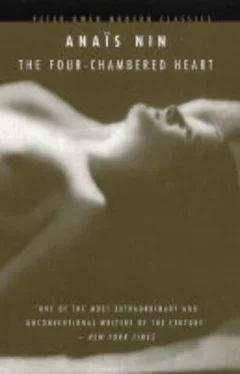Anaïs Nin - The Four-Chambered Heart
Здесь есть возможность читать онлайн «Anaïs Nin - The Four-Chambered Heart» весь текст электронной книги совершенно бесплатно (целиком полную версию без сокращений). В некоторых случаях можно слушать аудио, скачать через торрент в формате fb2 и присутствует краткое содержание. Год выпуска: 2004, ISBN: 2004, Издательство: Peter Owen Limited, Жанр: Классическая проза, Эротические любовные романы, на английском языке. Описание произведения, (предисловие) а так же отзывы посетителей доступны на портале библиотеки ЛибКат.
- Название:The Four-Chambered Heart
- Автор:
- Издательство:Peter Owen Limited
- Жанр:
- Год:2004
- ISBN:9780720611557
- Рейтинг книги:3 / 5. Голосов: 1
-
Избранное:Добавить в избранное
- Отзывы:
-
Ваша оценка:
- 60
- 1
- 2
- 3
- 4
- 5
The Four-Chambered Heart: краткое содержание, описание и аннотация
Предлагаем к чтению аннотацию, описание, краткое содержание или предисловие (зависит от того, что написал сам автор книги «The Four-Chambered Heart»). Если вы не нашли необходимую информацию о книге — напишите в комментариях, мы постараемся отыскать её.
The Four-Chambered Heart — читать онлайн бесплатно полную книгу (весь текст) целиком
Ниже представлен текст книги, разбитый по страницам. Система сохранения места последней прочитанной страницы, позволяет с удобством читать онлайн бесплатно книгу «The Four-Chambered Heart», без необходимости каждый раз заново искать на чём Вы остановились. Поставьте закладку, и сможете в любой момент перейти на страницу, на которой закончили чтение.
Интервал:
Закладка:
There is a visit to the pawnbroker, because one must pay the other doctor, the one who made the futile, the dramatic, test for cancer. Djuna’s allowance for the month is finished.
There is no escape. The day crumbles soon after it is born. The only tree she will see will be the anemic tree of the hospital garden.
A useless, abortive sacrifice gives sadness.
The day is the trap, but she does not dare revolt. If she wants her half-night with Rango, this is the only path to reach it. At the end of the day there will be his fervent kisses, his emotion, his desire, the bites of hunger on the shoulder, vibrations of pleasure shaking the body, the guttural moans of men and women returning to their primitive origin…
Sometimes there is no time for undressing. At others, the climax is postponed teasingly, arousing frenzy. The dross of the day is burned away.
When Djuna thinks during the day, “I must run away. I must leave Rango to his chosen torment,” it is the remembrance of this point of fire which binds her.
How can Rango admire Zora’s rotting away—not even a noble suicide, but a fixed obsession to die slowly, dragging others along with her? A life ugly and monstrous. If she washes a dish, she complains. If she sews a button, she laments.
These are Djuna’s thoughts, and she must atone for them too. Zora, take this bread I traveled an hour to find, it won’t nourish you, you are too full of poison within your body. Your first words to me were hypocritical, your talk about praying to be helped, and being glad I was the one, yes, because I was one who could be easily caught through compassion. You knew I would act toward you as you would never have acted toward me. I have tried to imagine you in my place, and I couldn’t. I know you would be utterly cruel.
On her way back to the barge she bought new candles, and a fur rug to lie on, because Rango believed it was too bourgeois to sleep on a bed like everybody else. They slept on the floor. Perhaps a fur, the bed of Eskimos, would be appropriate.
When Rango came, he looked at the candles and the fur like a lion looking at a lettuce leaf. But lying on it, his bronze desire is aroused and the primitive bed is baptized in memory of cavernous dwellings.
At this hour children are reading fairy tales from which Rango and Djuna were led to expect such marvels, the impossible. Rango had imagined a life without work, without responsibilities. Djuna had wanted a life of desire and freedom, not comfort but the smoothness of magical happenings, not luxury but beauty, not security but fulfillment, not perfection but a perfect moment like this one…but without Zora waiting to lie between them like an incubus…
Djuna was unprepared for Rango’s making the first leap out of the trap. It came unexpectedly at midnight as they were about to separate. Out of the fog of enswathing caresses came his voice: “We’re leading a selfish life. There are many things happening in the world; we should be working for them. You are like all the artists, with your big floodlights fixed on the sky, and never on earth, where things are happening. There is a revolution going on, and I want to help.”
Djuna did not think of the world or the revolution needing Rango, Rango and his bohemian indiscipline, his love of red wine, his laziness. She felt that Zora’s persecutions were driving him away. He was caught between a woman who wanted to die, and one who wanted to live! He had hoped to amalgamate the women, so he would not feel the tension between his two selves. He had thought only of his own emotional comfort. He had overlooked Zora’s egoistic ferocity, and Djuna’s clairvoyance. The alliance was a failure.
Now he was driven to risk his life for some impersonal task.
She was silent. She looked at ace and saw that his mouth looked unhappy, wounded, and revealed his desperateness. He kept it tightly shut, as women do when they don’t want to weep. His mouth which was not in keeping with his lion’s head, which was the mouth of a child, small and vulnerable; the mouth which aroused her indulgence.
Parting at the corner of the street, they kissed desperately as if for a long voyage. A beggar started to play on his violin, then stopped, thinking they were lovers who would never see each other again.
The blood beat in her ears as she walked away, her body parting from Rango in anticipation, hair parting from hair, hands unlocking, lips closing against the last kiss, surrendering him to a more demanding mistress: the revolution.
The earth was turning fast. Women cannot walk out of the traps of love, but men can; they have wars and revolutions to attend to. What would happen now? She knew. One signed five sheets of paper and answered minute, excruciatingly exact questions. She had seen the questionnaire. One had to say whether one’s wife or husband believed in the revolution; one had to tell everything. Rango would be filling these pages slowly, with his nervous, rolling, and swaying handwriting. Everything. He would probably say that his wife was a cripple, but the party would not condone a mistress.
Then suddenly the earth ceased turning and the blood no longer rang in her ear. Everything stood deathly still because she remembered the dangers. She remembered Rango’s friend who had been found with a bullet hole in his temple, near the cafe where they met. She remembered Rango’s story about one of the men who worked for the revolution in Guatemala: the one who had been placed in a jail half full of water until his legs rotted away in strips of moldy flesh, until his eyes turned absolutely white.
The next evening Rango was late. Djuna forgot that he was always late. She thought: he has signed all the papers, and been told that a member of the party cannot have a mistress.
It was nine o’clock. She had not eaten. It was raining. Friends came into the cafe, talked a little, and left. The time seemed long because of the anxiety. This is the way it would be, the waiting, and never knowing, if Rango were still alive. He would be so easily detected. A foreigner, dark skin, wild hair, his very appearance was the one policemen expected from a man working for the revolution.
What had happened to Rango? She picked up a newspaper. Once he had said: “I picked up a newspaper and saw on the front page the photograph of my best friend, murdered the night before.”
That is the way it would happen. Rango would kiss her as he had kissed her the night before at the street corner, with the violin playing, then the violin would stop, and that very night…
She questioned her instinct. No, Rango was not dead. She would like to go to church, but that was forbidden, too. Despair was forbidden. This was the time for stoicism.
She was jealous of Rango’s admiration for Gauguin’s mother, a South American heroine, who had fought in revolutions and shot her own husband when he betrayed the party.
Djuna walked past the church and entered. She could not pray because she was seeking to transform herself into the proper mate for a revolutionist. But she always felt a humorous, a private, connivance with god. She felt he would always smile with irony upon her most wayward acts. He would see the contradictions, and be indulgent. There was a pact between them, even if she were considered guilty before most tribunals. It was like her friendliness with the policemen of Paris.
And now Rango walked toward her! (See what a pact she had with god that he granted her wishes no one else would have dared to expect him to grant!)
Rango had been ill. No, he had not signed the papers. He had overslept. Tomorrow. Manana.
Djuna had forgotten this Latin deity: Manana.
At the Cafe Martiniquaise, near the barge, Rango and Djuna sat drinking coffee.
The place was dense with smoke, voices, faces, heaving and swaying like a compact sonorous wave, washing over them at times and enswathing them, at others retreating as if subdued, only to return again louder and more suffocating to engulf their voices.
Читать дальшеИнтервал:
Закладка:
Похожие книги на «The Four-Chambered Heart»
Представляем Вашему вниманию похожие книги на «The Four-Chambered Heart» списком для выбора. Мы отобрали схожую по названию и смыслу литературу в надежде предоставить читателям больше вариантов отыскать новые, интересные, ещё непрочитанные произведения.
Обсуждение, отзывы о книге «The Four-Chambered Heart» и просто собственные мнения читателей. Оставьте ваши комментарии, напишите, что Вы думаете о произведении, его смысле или главных героях. Укажите что конкретно понравилось, а что нет, и почему Вы так считаете.












